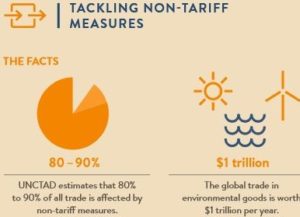While a number of international efforts have been progressing in the elimination of tariff barriers, a comprehensive initiative to phase out non-tariff barriers on products covered in the current multi-national environmental goods tariff negotiations could be undertaken.
These topics are only just starting to be addressed within the World Trade Organisation (WTO) rules and appear to be limited, states the report launched at the APEC Market Access Group meeting in Lima, Peru, on 18 August.
The World Energy Perspective 2016: ‘Non-tariff measures: next steps for catalysing the low-carbon economy’, published by the Council’s Rules of Trade Knowledge Network, includes experts from 28 countries. It explores how an open global trade and investment regime focussing on energy and environmental goods and services, can foster the transition to a low carbon economy.
As a trade barrier, non-tariff measures (NTMs), frequently relate to customs procedures and import requirements, technical standards and other regulations that impede the flow of goods and services. NTMs affect between 80% and 90% of trade. Therefore, understanding and tackling NTMs that impact on the low-carbon energy sector should be a priority in a country’s efforts to successfully address its energy trilemma.
A session on trade and innovation will play a central part in discussions at the 23rd World Energy Congress in October, which will see global energy leaders address the critical energy frontiers facing the global energy sector today. ‘The imperative of trade: Accelerating the innovation transfer’ is one of the Congress sessions addressing Governance frontiers. It will be led by Morlaye Bangoura, Commissioner, Energy and Moines, ECOWAS, Nigeria along side Ricardo Melendez-Ortiz, Chief Executive Officer, International Centre for Trade and Sustainable Development (ICTSD), Switzerland and Timothy Richards, Executive Chair, Rules of Trade, World Energy Council on the 12 October.
The report identifies significant NTMS directly affecting investments in the energy industry:
-
Local content requirements that are not carefully structured can hamper local and foreign investments in research and development and limit low-carbon technology transfer and energy projects due to a lack of local capabilities
-
Government procurement practices inhibit competition when they favour domestic suppliers and imposing burdensome administrative compliance
-
Transparent and efficient application of custom procedures help to avoid arbitrary and unnecessary formalities in trading energy and environmental goods
-
NTMs related to environmental goods should be addressed to enable the energy sector to transition towards decarbonisation in cost-effective and efficient manner
-
Subsidies for energy technologies should be well designed or they could result in inefficient and unsustainable use of subsidised energy
-
Where existing rules apply these should be enforced as needed
-
Where rules do not exist WTO members should consider developing them






